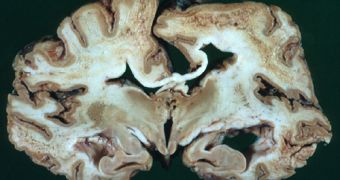If a virus can barely be considered a living structure (in fact most biologists consider that it's not), the threshold can be pushed further at the limit between life and death obtaining the prions, infecting proteins.
As the main weapon against a virus is the vaccine, now researchers are investigating for similar vaccines against human prions that develop Creutzfeld-Jacob Disease (CJD), a brain condition that destroys the organ after an evolution that goes on for years.
Perhaps the most spectacular human disease was the "Kuru", a brain destroying prion spread inside a tribe of New Guinea through the practice of cannibalism. Unlike CJD, Kuru killed in a matter of months.
Now researchers have developed a vaccine that stops mice getting a brain disease similar to Bovine Spongiform Encephalopathy (BSE), commonly known as "Mad Cow Disease", the main source for human CJD, and this could result in a protection against CJD.
The deadly prions are transmitted through contaminated meat consumption and there's no cure or treatment to fight against them. "A vaccine that decreases the spread of prion disease in animals would reduce the risk of spread in humans," said the New York University team.
The diseases are provoked by the accumulation of the mutated prion proteins in the brain, inducing brain damage, dementia, abnormal limb movements and in the final stage, loss of all neurological functions.
When the prions take over, they make normal proteins acquire their own misfolded shape.
The prototype vaccine made by the team led by Dr Thomas Wisniewski was tested on prions bound to genetically engineered Salmonella bacteria. Most mice that took the oral vaccine displayed no symptoms of the prion disease even after 400 days, while others had delayed the prions' activity. Mice which did not receive the vaccine developed the prion disease in 120 days.
The researchers are now redesigning the vaccine for deer and cattle, and in the future, the humans variant will also be tested. "If, for example, a more significant outbreak of chronic wasting disease in deer and elk occurs and if it were transmissible to humans, then we would need a vaccine like this to protect people in hunting areas. Or it could be given to delay disease in people with hereditary forms of prion disease or people who have been exposed to vCJD", Wisniewski explained.
"These findings show that prion disease can be prevented and this is quite important. The major limitation of applying these findings to humans is that it remains impossible to tell who will develop CJD and who will not. If further work demonstrates that vaccination during early signs reverses symptoms, then it would be usable in treatment", said Professor David Brown, a prion disease expert at Bath University, UK.

 14 DAY TRIAL //
14 DAY TRIAL //